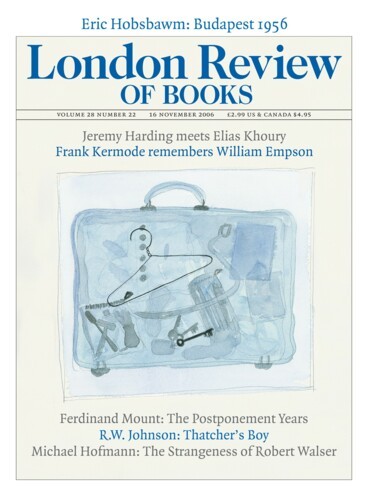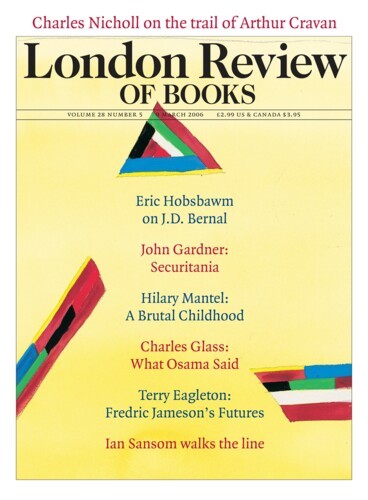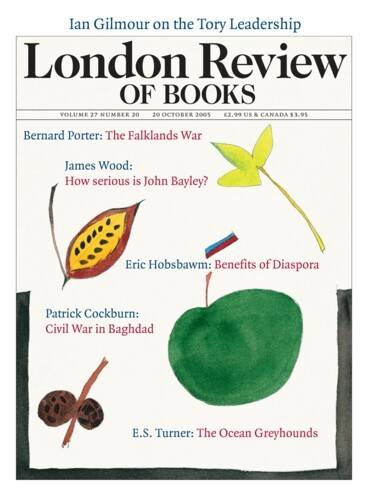Eric Hobsbawm
Eric Hobsbawm, who died on 1 October 2012 at the age of 95, was one of the foremost historians of the 20th century. His many books include a three-part study of the ‘long 19th century’ (The Age of Revolution, The Age of Capital and The Age of Empire), Age of Extremes: The Short 20th Century and a memoir, Interesting Times.
Could it have been different? Budapest 1956
Eric Hobsbawm, 16 November 2006
Contemporary history is useless unless it allows emotion to be recollected in tranquillity. Probably no episode in 20th-century history generated a more intense burst of feeling in the Western world than the Hungarian uprising of 1956. Although it lasted less than two weeks, it was both a classic instance of the narrative of justified popular insurrection against oppressive government, familiar since the fall of the Bastille, and of David’s in this case doomed victory against Goliath.
Red Science
9 March 2006
Red Science: J.D. Bernal
Eric Hobsbawm, 9 March 2006
Let me begin with a motor trip in 1944 by two scientists down the valley from Lord Mountbatten’s headquarters in Kandy to the jungle. The younger of the two remembers what his companion talked about. He was
interested and expert in everything around him – the war, Buddhist religion and art, the geological specimens he would retrieve from every ditch, the properties of mud,...
Benefits of Diaspora
20 October 2005
Podcasts & Videos
Anthony Wilks's film traces the connections between the events of Eric Hobsbawm’s life and the history he told, from his teenage years in Germany and his communist membership, to the jazz clubs of 1950s...
Pieces about Eric Hobsbawm in the LRB
Indomitable: Marx and Hobsbawm
Terry Eagleton, 3 March 2011
In 1976, a good many people in the West thought that Marxism had a reasonable case to argue. By 1986, most of them no longer felt that way. What had happened in the meanwhile? Were these people...
The Age of EJH: Eric Hobsbawm’s Memoirs
Perry Anderson, 3 October 2002
What apter practitioners of autobiography than historians? Trained to examine the past with an impartial eye, alert to oddities of context and artifices of narrative, they would appear to be the...
Contra Mundum
Edward Said, 9 March 1995
A powerful and unsettling book, Eric Hobsbawm’s Age of Extremes brings to a close the series of historical studies he began in 1962 with The Age of Revolution: Europe 1789-1848, and...
Where will this voyage end?
Neal Ascherson, 14 June 1990
Historians as a tribe are suckers for anniversaries, no less than journalists. And both professions are equally unwilling to leave a nice, juicy coincidence alone, in the spirit of that...
Hobsbawm Today
Ross McKibbin, 22 June 1989
Eric Hobsbawm is one of Britain’s most creative Marxist historians. Anyone who teaches at a school or university is aware of the effect of his writing, even on those who do not know from...
History and the Left
Jonathan Haslam, 4 April 1985
In 1977 E.H. Carr completed his 14-volume History of Soviet Russia. He had embarked on an intellectual day excursion but found himself on a major expedition through a dark continent of knowledge....
Pastiche
Norman Stone, 21 July 1983
One of Arnold Toynbee’s Laws was that, in any civilisation, mannered imitation of the past was a Bad Thing: he chose the Poles’ decision to reconstruct the Old City of Warsaw after...
Marxismo
Jon Elster, 18 March 1982
Up to a fairly recent time it was the case that all good books on Marx were hostile, or at most neutral. Correlatively, all the books that espoused Marx’s views did so in a way that could...
On the State of the Left
W.G. Runciman, 17 December 1981
Ever since the Industrial Revolution and the first stirrings of socialist political theory, the intellectual protagonists of the Left have started with a twofold debating advantage over their...
Read anywhere with the London Review of Books app, available now from the App Store for Apple devices, Google Play for Android devices and Amazon for your Kindle Fire.
Sign up to our newsletter
For highlights from the latest issue, our archive and the blog, as well as news, events and exclusive promotions.



